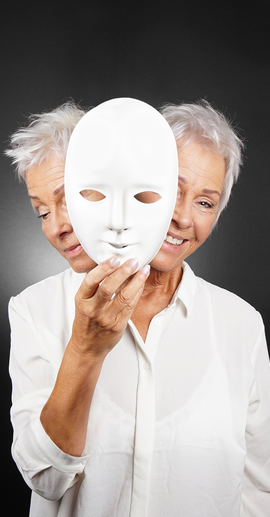
Bipolar Disorder
Bipolar disorder is also known as manic depression. It is a mental illness that has extreme high and low moods. It causes changes in sleep, energy, thinking, and behavior. People with bipolar disorder endure periods of feeling overly happy and energized and then other periods of being very sad, hopeless, and sluggish. In between, they usually feel normal. The highs and the lows can be thought of as two "poles" of mood, which is why it's called "bipolar" disorder.
The word "manic" describes when someone feels overly excited and confident. It can also involve irritability and impulsivity or reckless decision-making. Some people during mania will also have delusions (believing things that aren't true and that they can't be talked out of) or hallucinations (seeing or hearing things that aren't there). "Hypomania" describes milder symptoms of mania, in which someone does not have delusions or hallucinations, and their high symptoms do not interfere with their everyday life.
The word "depressive" is when the person feels very sad or depressed. Those symptoms are the same as those described in major depressive disorder or "clinical depression." This is a where a person never has manic or hypomanic episodes. Most people with bipolar disorder spend more time with depressive symptoms than manic or hypomanic symptoms.
.

Symptoms of Bipolar Disorder
In bipolar disorder, the dramatic episodes of high and low moods do not follow a set pattern. Someone may feel the same mood state (depressed or manic) several times before switching to the opposite mood. These episodes can happen over a period of weeks, months, and sometimes even years. How severe it gets differs from person to person and can also change over time, becoming more or less severe.
Symptoms of mania ("the highs"):
- Excessive happiness, hopefulness, and excitement
- Sudden changes from being joyful to being irritable, angry, and hostile
- Restlessness
- Rapid speech and poor concentration
- Increased energy and less need for sleep
- Unusually high sex drive
- Making grand and unrealistic plans
- Showing poor judgment
- Drug and alcohol abuse
- Becoming more impulsive
During depressive periods ("the lows"):
- Sadness
- Loss of energy
- Feelings of hopelessness or worthlessness
- Not enjoying things they once liked
- Trouble concentrating
- Uncontrollable crying
- Trouble making decisions
- Irritability
- Needing more sleep
- Insomnia
- Appetite changes that make them lose or gain weight
- Thoughts of death or suicide
- Attempting suicide
